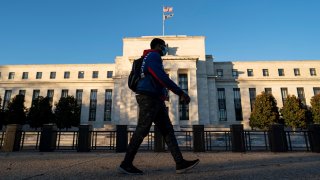
- Wall Street kicked off 2021 with its worst first trading day in years amid signs of increasing inflation.
- If inflation rises faster than expected, that could be toxic for investors.
- "There's this idea that central banks are constantly in control of things. If there's one thing that will change that, it's the kryptonite of higher inflation," said Peter Boockvar of Bleakley Advisory Group.
The Federal Reserve enters the new year with a fresh challenge on its plate, namely whether its commitment to higher inflation will bring power or poison to financial markets.
Wall Street kicked off 2021 with its worst first trading day showing in years, as major averages slumped Monday at a time when investors were still counting on the last days of a Santa Claus rally.
While some pundits looked at political uncertainty as a major underpinning for the plunge, an inflation trade also was at work.
A key indicator, which looks at the relationship between Treasury yields and inflation-protected bonds of the same duration, rose to levels not seen in more than two years.
The "breakeven" rate for 10-year inflation expectations briefly touched 2%, a level that policymakers consider healthy but also was indicative of a market that already is looking for pressure while the Fed's favorite indicator is closer to 1.4%.
Money Report
Central bank officials have said they will tolerate levels higher than 2% in an effort to gin up expectations, rev the economy and get back to full employment. But if inflation rises faster than expected, that could be toxic for investors as it would force the Fed to tighten policy sooner than officials would like.
"They're purposely inflating a bubble and then rooting for the exact thing that pops it," said Peter Boockvar, chief investment officer at Bleakley Advisory Group. "There's this idea that central banks are constantly in control of things. If there's one thing that will change that, it's the kryptonite of higher inflation."
Indeed, some market participants are starting to worry that with stock valuations reaching generational highs and the Fed so far not sharing any bubble concerns, the market could be in for a reckoning.
"It's as if the market is expecting the Fed to solve all it's problems. One of those problems may be that the Fed has to deal with too much inflation," said Quincy Krosby, chief market strategist at Prudential Financial. "They may get what they're asking for."
To be sure, investors had plenty to digest Monday beside inflation fears. A clean electoral sweep for Democrats has become a bigger threat in recent days, with polls tightening in two Georgia Senate races that will decide the balance of power in the upper chamber.
There also are ongoing Covid-19 fears, this time over the slow rollout of long-awaited vaccines amid a continued rise in cases and a willingness by some public officials to institute more shutdowns like the ones that crippled the economy in the second quarter of 2020.
It all added up to a big headache for stocks to start a new year in which most of Wall Street is expecting double-digit percentage gains for the major averages.
A sneak preview
"These pockets of volatility are healthy as long as they don't feed through into the overall market, as long as they can remain contained," Krosby said.
However, considering the symbiotic relationship that the Fed has with the markets, any threats to the efficiency of monetary policy or indications that rate hikes are on the horizon, would be problematic.
At this point, the specter of inflation rising much faster than the Fed anticipates is the greatest danger, even though much of Wall Street for now expects pressures to ease later in the year.
"This to me is the dress rehearsal of how this year is going to play out," Boockvar said. "It's going to be commodity areas that trade well, it's going to be higher P/E stocks that are at risk if this inflation story gets stronger, which I think it will."
Indeed, gold, copper and silver all traded higher Monday, as precious metals are a classic inflation trade. Some areas of the commodity space didn't do as well, with oil off about 1.4%. Overall, broad commodity indexes were around flat for the day, well outperforming equity benchmarks.
Earlier in the day, Chicago Fed President Charles Evans underscored the inflation commitment, saying in a speech that ultra-easy monetary policy likely would be the rule well into the future.
"The bottom line is that it will take a long time for average inflation to reach 2%," Evans said. "To meet our objectives and manage risks, the Fed's policy stance will have to be accommodative for quite a while."
Worries over inflation run roughly parallel with concerns that after a meteoric rise off the March lows, which themselves only briefly interrupted a bull market that began in March 2009, an equity bubble is about to pop.
Stocks are trading about 22 times forward earnings, well above the five-year average of 17.4 and even more above the 10-year trend of 15.7 times. The Shiller cyclically adjusted price-to-earnings ratio, or CAPE as it is known, is at 33.6, double its long-term average and higher than the Black Tuesday market crash during the Great Depression. The Shiller CAPE looks at earnings over the past 10 years to gauge where longer-term valuations sit.
Still, Fed officials are expected to hold to their position that accommodative policy is needed at a time when the economy is still in crisis. Fed Chairman Jerome Powell, asked at his post-meeting news conference last month whether he worries about market valuations, said the low rates are justifying the prices and helping to prevent corporate bond defaults.
Yardeni Research head Ed Yardeni said in a note Monday that the Powell statement indicates that "the Fed's solution to the zombie problem in the business sector is to exacerbate it by allowing corporations to borrow at record-low interest rates as investors continue to reach for yield by purchasing the bonds of lots of dodgy companies."
But Krishna Guha, who runs the central bank strategy team at Evercore ISI, said the Fed policy is "in the sweet spot" for markets and will remain "historically accommodative."
"When we say historically accommodative we mean this literally – that policy and real rates will be unprecedentedly easy relative to the condition and outlook for the economy as we move deeper into the recovery," Guha wrote.






